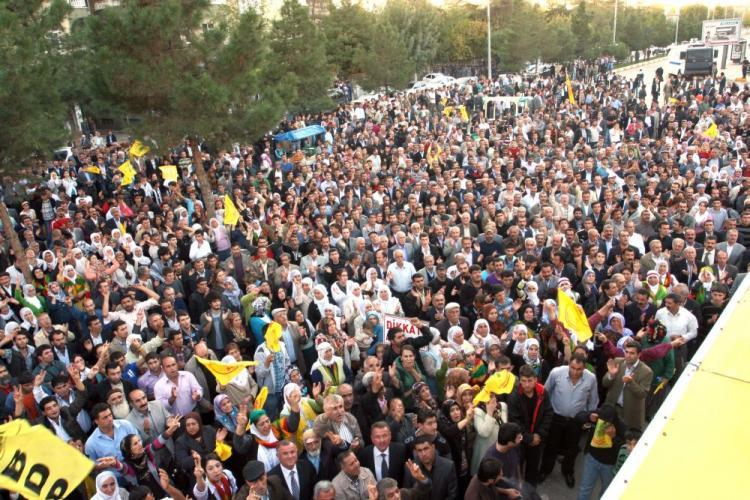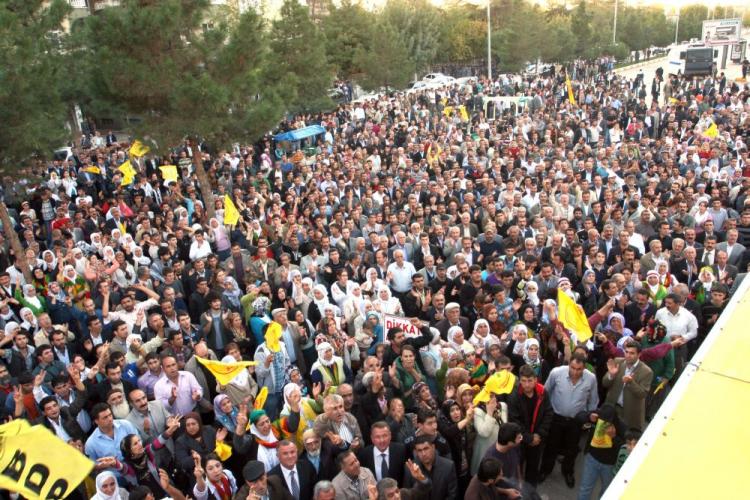More than 150 Kurds on Monday went on trial in Turkey accused of being linked to the radical Kurdish Workers’ Party (PKK), which is seeking Kurdish autonomy within the country. The move is considered to be a test of Ankara’s democratic commitments.
The Turkish government has accused the defendants, 103 of whom are under arrest, of the crimes of being involved in a rebel group and staging illegal demonstrations, according to the 7,578-page indictment.
Among the accused are 12 elected mayors from the Peace and Democracy Party (BDP) that was banned last year by the constitutional court over suspicions of having links with the PKK.
The Turkish prosecutors have insisted that the defendants received a 15-year term or life sentence without possible amnesty, Hurriyet Daily News reported.
The proceedings took place in Diyarbakir, the largest city in the heavily Kurdish southeastern region of Turkey, with hundreds of supporters for the defendants gathering at the courthouse. Security was tight and the courtroom had to be specifically built for the case, media reports said.
The Kurdish people are an integral part of the Middle East, as Kurds live in Turkey, Syria, Iraq, and Iran. Comprising almost a fifth of the population in Turkey, the Kurds demand autonomy; the constitutional recognition of their ethnic differences, allowing them to officially use the Kurdish language; and political involvement for decision-making processes.
The 26-year armed conflict between the PKK and Turkish military forces has caused some 40,000 deaths and left hundreds of thousands displaced.
For the last several years, armed tensions have decreased since the detention of the movement’s leader Abdullah Ocalan. The PKK is considered to be a terrorist group not only in Turkey, but in the United States, and Europe.
The European Union is said to be monitoring the trial and is expected to present a report on Turkey’s progress to join the EU, which Ankara first applied for 1987.
“We see this trial as an attempt to break our will,” said Ahmet Turk, a former parliamentarian who lost the seat after his BDP party was banned for alleged links to the PKK, Reuters reported.
“At a time when we are seeking peace, it’s unacceptable that our friends are being held in jail for 18 months only for expressing their thoughts and opinions,” he added.
Ankara has already made some reforms for Kurdish people as part of the democratic transition to join the EU, including education and broadcasting in the Kurdish language, but still not enough to satisfy their demands.
Last year, Prime Minister Recep Tayyip Erdogan sought a peace solution by introducing a comprehensive Kurdish rights package, but the efforts have stalled.
Any tensions in reaching a peace deal between Ankara and the PKK could threaten stability in northern Iraqi Kurdistan, where the PKK has been based for the last several decades.
The Turkish government has accused the defendants, 103 of whom are under arrest, of the crimes of being involved in a rebel group and staging illegal demonstrations, according to the 7,578-page indictment.
Among the accused are 12 elected mayors from the Peace and Democracy Party (BDP) that was banned last year by the constitutional court over suspicions of having links with the PKK.
The Turkish prosecutors have insisted that the defendants received a 15-year term or life sentence without possible amnesty, Hurriyet Daily News reported.
The proceedings took place in Diyarbakir, the largest city in the heavily Kurdish southeastern region of Turkey, with hundreds of supporters for the defendants gathering at the courthouse. Security was tight and the courtroom had to be specifically built for the case, media reports said.
The Kurdish people are an integral part of the Middle East, as Kurds live in Turkey, Syria, Iraq, and Iran. Comprising almost a fifth of the population in Turkey, the Kurds demand autonomy; the constitutional recognition of their ethnic differences, allowing them to officially use the Kurdish language; and political involvement for decision-making processes.
The 26-year armed conflict between the PKK and Turkish military forces has caused some 40,000 deaths and left hundreds of thousands displaced.
For the last several years, armed tensions have decreased since the detention of the movement’s leader Abdullah Ocalan. The PKK is considered to be a terrorist group not only in Turkey, but in the United States, and Europe.
The European Union is said to be monitoring the trial and is expected to present a report on Turkey’s progress to join the EU, which Ankara first applied for 1987.
“We see this trial as an attempt to break our will,” said Ahmet Turk, a former parliamentarian who lost the seat after his BDP party was banned for alleged links to the PKK, Reuters reported.
“At a time when we are seeking peace, it’s unacceptable that our friends are being held in jail for 18 months only for expressing their thoughts and opinions,” he added.
Ankara has already made some reforms for Kurdish people as part of the democratic transition to join the EU, including education and broadcasting in the Kurdish language, but still not enough to satisfy their demands.
Last year, Prime Minister Recep Tayyip Erdogan sought a peace solution by introducing a comprehensive Kurdish rights package, but the efforts have stalled.
Any tensions in reaching a peace deal between Ankara and the PKK could threaten stability in northern Iraqi Kurdistan, where the PKK has been based for the last several decades.





